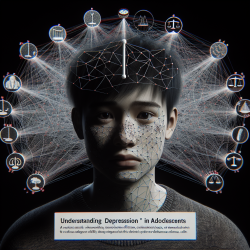In the realm of special education and therapy services, staying informed about public health policies and their implications is crucial. A recent study titled "Effects of front-of-package caffeine and sweetener disclaimers in Mexico: cross-sectional results from the 2020 International Food Policy Study" offers valuable insights that can be leveraged by practitioners to enhance their skills and improve service delivery. This blog post delves into the research findings and explores how they can be applied in practice.
The Study: Key Findings
The study examined the impact of front-of-package caffeine and sweetener disclaimers on consumer perceptions in Mexico. Implemented in 2020, these disclaimers were part of a broader public health strategy aimed at reducing the consumption of unhealthy foods and beverages. The research revealed high awareness and usage of these disclaimers among Mexican adults and youth shortly after their introduction.
Key findings include:
- Over 80% of participants had seen the disclaimers at least rarely, with more than 60% using them sometimes or frequently.
- The sweetener disclaimer significantly reduced the perceived healthfulness of sweetened drinks among both adults and youth.
- The caffeine disclaimer did not affect adults' perceptions of caffeinated drinks' healthfulness.
Implications for Practitioners
For practitioners in special education and online therapy services, these findings offer several avenues for application:
- Enhancing Communication: Understanding how disclaimers influence perceptions can help practitioners communicate more effectively with clients about dietary choices and their impacts on health.
- Incorporating Public Health Insights: By integrating knowledge about public health policies into therapy sessions, practitioners can provide holistic care that addresses both educational and health-related needs.
- Encouraging Critical Thinking: Practitioners can use these findings to encourage critical thinking among students about food marketing practices and their potential effects on health perceptions.
Encouraging Further Research
The study highlights the importance of ongoing research into public health interventions. Practitioners are encouraged to stay informed about new developments in this area and consider participating in or supporting further research efforts. By doing so, they can contribute to a deeper understanding of how such interventions impact behavior and health outcomes.
Conclusion
The research on caffeine and sweetener disclaimers in Mexico provides valuable insights that can enhance practitioner skills in special education and online therapy. By leveraging these findings, practitioners can improve communication with clients, incorporate public health insights into their practice, and encourage critical thinking among students. As we continue to navigate complex public health challenges, staying informed and proactive is essential for delivering effective services.
To read the original research paper, please follow this link: Effects of front-of-package caffeine and sweetener disclaimers in Mexico: cross-sectional results from the 2020 International Food Policy Study










